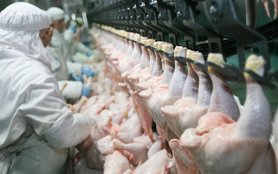In 2018, Oxfam launched Behind the Barcodes to examine policies and practices of supermarket chains around the world—and to pressure them to do better. Today, we’re delighted to welcome significant new commitments on human rights from Kroger, the second largest food retailer in the US.
Since the roots of power are complicated, Oxfam’s efforts to challenge it take many forms. Our Behind the Barcodes campaign involves research, protests, media, and direct outreach to the companies. When one of these pays off, it can make a huge difference in the lives of countless people.
One tactic is to own shares, and to file shareholder resolutions to pressure publicly held companies to make changes. In 2020, we filed such a resolution with Kroger, the second largest food retailer in the US. A surprising 45% of Kroger’s shareholders voted to support efforts to conduct Human Rights Due Diligence (HRDD) and include it in its human rights policy.
We refiled this year to keep the pressure on the company to step up–and Kroger did! Kroger recently published an updated Statement on Human Rights; as a result, Oxfam withdrew our shareholder resolution.
This is very significant for Kroger, which has come a long way since the start of our campaign. A summary of the company’s important commitments:
- To conduct a comprehensive gap analysis of Kroger’s current human rights governance and policies compared to the UNGP HRDD process and publish its key findings, as well as an updated framework and policy, by late 2021.
- Based on the results, to formulate a timebound and meaningful action plan, aligned with the HRDD process, with consultations with key stakeholders including women and local communities, and identify geographic and/or product areas of focus.
- To conduct and publish three Human Rights Impact Assessments (HRIA) in three high-risk supply chains that include a gender-analysis component for the 2022 ESG report.
- To closely monitor the results of virtual audits, worker voice surveys and government/industry alerts to keep abreast of human rights situation during the pandemic and eventual recovery.
- To work in partnership with suppliers to engage other local stakeholders as part of the three HRIAs as a starting point.
These steps align with Oxfam’s recommendations on workers’ rights to supermarkets, and we commend the company for committing to improve the livelihoods of workers, families, and communities around the world. Throughout our engagement, Oxfam made clear that we were looking for meaningful, public, company-wide commitments.
When our campaign launched in 2018, the company scored poorly on our Supermarket Scorecard, which assesses global supermarkets across four themes: Workers’ rights, Small-scale Farmers, Supply chain transparency, and Gender equality.
While these new HRDD commitments are very significant, we encourage Kroger to go further. We would like to see Kroger become one of the world’s leading food retailers that fundamentally shifts its business model to deliver fair share of income to workers and farmers, and actively engage with governments, trade unions, workers’ representatives, and industry peers to protect labor and human rights.
Oxfam will continue to focus on Kroger and other major supermarkets’ commitments towards ending human rights violations in supply chains. We strongly urge other major US retailers–Walmart, Amazon, Costco, and Albertsons Companies-- to follow Kroger’s significant first steps and then go further.
Now more than ever
During the pandemic, supermarkets have played a major part in our daily lives, one of the few “essential” services that kept open to keep us fed and safe during the lockdown.
However, the pandemic also revealed the vulnerability of our global food supply chains–especially the impact on the often-invisible frontline workforce who produce the food. Oxfam has highlighted the fragile state of supply chain workers and farmers before. In 2013, the Behind the Brands campaign was launched to influence the sourcing policies of the world’s ten biggest food and beverage companies. In 2018, we launched Behind the Barcodes.
Let’s be clear: the critical issues we raised have now intensified because of COVID-19. Inequality and human suffering have deepened, as the global economy is being hit by the worst recession since World War II. Workers’ income has fallen, and women have found it tougher to continue working full-time while filling care responsibilities for their families.
While the situation is far from over in developing countries, sales have been surging for global supermarkets. So they can and must use their profits and power to end human misery in their global supply chains.
The pandemic has been a bleak year for almost everyone in one way or another–but it also provides a once-in-a-generation opportunity for the world’s most powerful supermarkets to radically shift their focus to achieve more resilient, inclusive, and fair global food systems. Because at the end, none of us wants human suffering in the food we buy.



